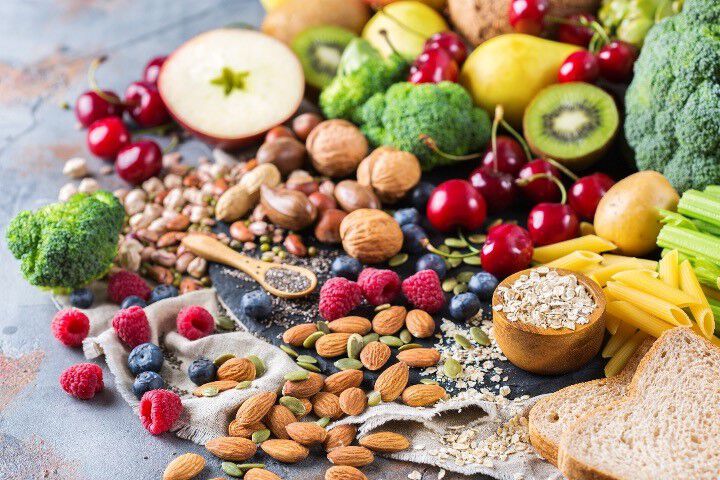Digestive Support
GLP-1 & Nutrition: What You Need to Know

Recently, GLP-1 medications have become a hot topic, making waves in both news headlines and everyday conversations. Whether you've started taking a GLP-1 agonist or are curious, knowing how it affects your nutritional needs is important. Keep reading to learn more about GLP-1’s, what they do, and information about what food recommendations while taking GLP-1’s.
What is GLP-1?
GLP-1 is short for glucagon-like peptide-1, a hormone our bodies make that helps regulate blood sugar and appetite. There are medications that mimic this hormone, called GLP-1 agonists. Some people will refer to these medications as just ‘GLP-1s’ too, so it can be a bit confusing!
Why do people take GLP-1 agonists?
GLP-1 agonists are used for people with type 2 diabetes and obesity. These medications work by lowering blood sugar, slowing stomach emptying after eating, and increasing feelings of fullness after meals. Many people lose significant weight while taking GLP-1 agonists. Your healthcare professional is the best person to help you determine if taking this medication is the right decision for you.
What foods should you eat while on GLP-1 agonists?
While taking GLP-1 agonists, many people have a reduced-calorie diet. People who have a reduced calorie intake can have a hard time eating enough vitamins and minerals, simply because they aren’t eating as much food. Here are some foods and nutrients to keep in mind:
Choose nutrient dense
The main concern is that when eating less food overall, you may not get all the nutrients you need. Foods considered ‘nutrient dense’ provide more vitamins, minerals, and fiber per gram of food, so each bite counts. Choose nutrient-dense foods like whole grains, fruits, vegetables, beans, lentils, eggs, lean meats, fish, and nuts.
Protein
For many people, as they lose weight they can often lose muscle. This can have negative impacts on your body, like reduced strength and a lower metabolism. Ensuring that you are eating enough protein, along with resistance training, can help reduce the amount of muscle that you will lose. Foods that are a good source of protein include animal proteins like beef, chicken, lamb, pork, fish, dairy, and eggs. Non-animal-based protein sources include tofu, beans, lentils, seeds, and nuts.
Fiber
With a reduced intake of food, it can be difficult to consume enough fiber. The Institute of Medicine recommends 25-38 grams of fiber per day. Most Americans do not get nearly that much fiber daily. And if you are eating fewer calories, it may be even harder to get enough fiber. But don’t despair – there are many ways to add fiber to your day!
Fiber is found in plant-based foods like fruits, vegetables, beans, lentils, nuts, seeds, and whole grains. Some of the best fiber sources are foods like raspberries, blackberries, kiwis, cooked leafy greens, artichokes, peas, oatmeal, barley, almonds, lentils, and beans like chickpeas and black beans. Fiber supplementation can also help fill in some fiber gaps.
Vitamins & minerals
Vitamins and minerals are micronutrients that are essential for your body to function every day. From converting the food you eat into the energy you need to supporting your bones and heart, vitamins and minerals are critical.* Choosing nutrient-dense foods, like the ones mentioned above, will help ensure you get enough vitamins and minerals daily. It can also be helpful to take supplemental vitamins and minerals to help fill any nutritional gaps.
Are there foods you shouldn’t eat while on GLP-1 agonists?
For those on a reduced-calorie diet, consider limiting foods with little or no nutrition, also known as “empty calories.” These foods, like candy, processed food and snacks, sugary drinks, and many desserts typically don’t provide many nutrients to support your body. You may feel full, but your body won’t be getting the nutrients it needs.
GLP-1 supplements
If you are looking for GLP-1 supplements, vitafusion GLP-1 support gummies help fill nutritional gaps associated with a reduced calorie diet:
- GLP-1 Support Vitamin and Mineral Blend: With a tasty citrus berry flavor, these gummy vitamins provide 15 essential nutrients to help support your nutrient intake from reducing calories.
- GLP-1 Support Fiber, Plus D, B12 and Folate: With 6 grams of fiber and vitamins D, B12, and folate in every 3-gummy serving, these sugar-free gummies have a delightful citrus flavor.
GLP-1 supplements & nutrition: supporting your diet
People taking GLP-1 agonists generally experience a reduced appetite and feel full more quickly, leading to a smaller food intake. Focusing on eating enough protein and fiber, as well as nutrient-dense foods like lean meats, dairy products, fruits and vegetables, whole grains, beans, lentils, and nuts is essential. Vitafusion GLP-1 Support supplements are crafted to help fill nutritional gaps, so you can nourish your body and enjoy life’s new adventures!
Brought to you by the vitafusion™ nutrition experts.



